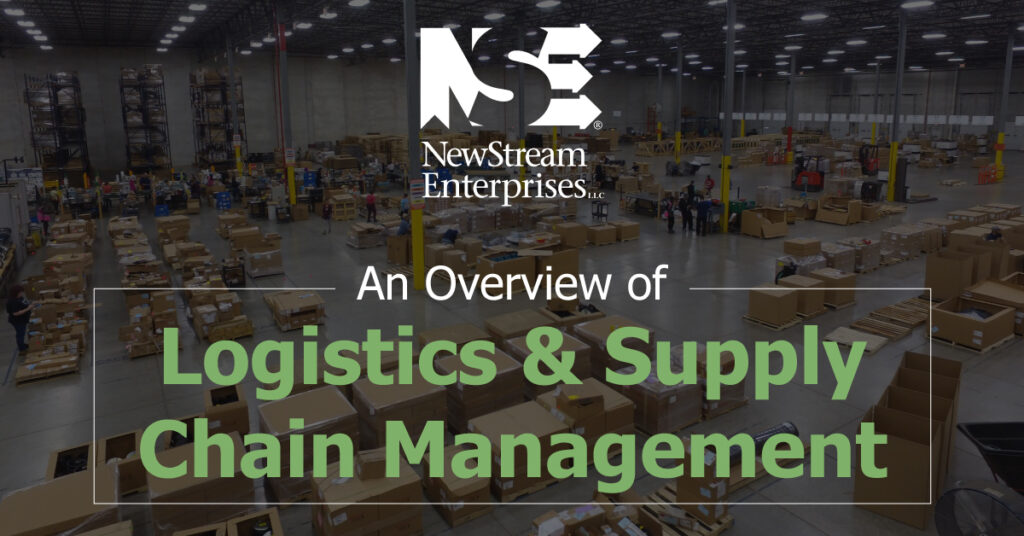Product managers, purchasing managers and VP’s are concerned with keeping their costs contained and reducing friction points, thus, proficient and well-planned logistics and supply chain management procedures will always be key. Whether outsourced to a 3rd party logistics provider (3PL) or done in-house, companies can increase cash flow and reduce costs with custom-designed logistics capabilities. Are you looking to better understand why you need to be making this a priority in your organization or considering looking for ways to improve your current operation? We have constructed an overview of logistics & supply chain management concepts to help you gain more perspective on this important topic.
Supply Chain Management
A supply chain refers to organizations within a system that contribute to moving a product from its supplier to a customer. These organizations can include people, certain activities, resources and information. Supply chain management is the management of the flow of goods and services throughout the supply chain.
Managing the supply chain involves planning, design, execution, quality control, and monitoring of everything involved. This includes the movement and storage of original materials. An integrated approach to supply chain management seeks to effectively deploy the areas of information technology, industrial engineering, system engineering, procurement, marketing, operations management, and logistics in a cohesive manner.
The Function of Supply Chain Management
Supply chain management solutions are intended to address the following:
- Distribution Network Configuration – Determining the number, location and intentions of suppliers, production facilities, distribution centers, warehouses, cross-docks and customers
- Cash Flow – Sorting payment terms and methods for exchanging funds throughout the supply chain
- Distribution Strategy – Strategies that include answering questions of operating control, delivery schemes, shipping, modes of transportation and transportation control
- Inventory Management – Location and quality of inventory, including raw materials, work-in-process and finished goods
- Trade-Offs in Logistical Activities – Determining what trade-offs may increase the total cost if only one of the activities is optimized, making it necessary to take a systematic approach when planning
- Sharing Information – Sharing valuable information such as demand signals, forecasts, inventory, transportation and potential collaborations

Organizations looking to remain focused on their core competencies often seek the expertise of supply chain management companies like NewStream Enterprises, LLC. This allows them to remain flexible while minimizing ownership of raw materials sources and channels of distribution. The importance of supply chain management for most companies ultimately comes down to cost containment. More cost-effective solutions result from dedicated supply chain management companies that can perform these functions more proficiently and do not get distracted with conflicting priorities as is often the case when insourced.
Supply Chain vs Logistics

While supply chain management refers to a sequence of processes involved in the production and distribution of a product, logistics is a general concept that can be applied to many different areas such as business, military and transportation. Logistics can be thought of as the way in which complex operations are organized and executed. Logistics management is the part of supply chain management that plans, implements, and controls the flow and storage of goods and related information between the point of origin to the point of consumption.
Benefits of Supply Chain Management
Organizations looking to be more competitive in the marketplace gain the following benefits from effective supply chains:
- Higher Efficiency
- Quality Assurance
- Reduced Costs
- Improved Inventory Management
- Reduction of Damaged Inventory
- Enhanced Contract Management
- More Responsive Systems
- Satisfied Customer Requirements
- Stronger Relationships with Vendors and Distributors
- Enhanced Vendor Insight
- More Proactive Approach to Sourcing Products and Materials
- Higher Level of Analysis
Best Practices in Logistics and Supply Chain Management
A successful supply chain management plan will address the following:
Strategic Supply Chain Management
- Network optimization including size and location of warehousing, distribution centers and other facilities
- Communication channels and strategic partnerships with distributors and suppliers
- Appropriate controls throughout the supply chain system to minimize risk
- Supply chain sustainability with socially responsible and green initiatives
- Management of product life cycle to implement new or existing products into the supply chain without disruption
- Consideration of the “total cost of ownership”, not just price
- Alignment of company-wide objectives with manufacturing and distribution
- Determination of long-term needs and resource commitments
Tactical Supply Chain Management
- Contract sourcing
- Purchasing decisions
- Decisions on contracting and scheduling
- Inventory decisions that include quantity and location
- Transportation considerations including routes and frequency
- Development of benchmarks and milestones for success
- Establishment of synergistic relationships with key suppliers
Operational Level Supply Chain Management
- Daily production and distribution planning
- Sourcing planning in coordination with all suppliers
- Appropriate staffing of the supply chain itself
- Production scheduling for manufacturers
- Coordination of customer demand forecast
- Coordination of inbound operations, including transportation from suppliers and receiving inventory
- Coordination of outbound operations including fulfillment, warehousing and transportation to customers
- Accounting for and resolving all transit damage cases
- Management of short-dated inventory.
Choosing the Right Supply Chain Management System
Outsourcing your supply chain management needs can be risky. While a successful supply chain management solution can greatly improve your company’s operations, making the right choice is crucial. When looking for a partner, look for a supply chain management partner that demonstrates exceptional knowledge and thought leadership in the field—one who first seeks to educate and add value, and invests time in establishing your trust. Companies to target are those who have proven experience in the implementation and optimization of supply chain management solutions across various industries. Relevant experience not only ensures that a similar system can be adapted for your needs, but also demonstrates practical experience for you to present to the decision makers within your organization. It’s also important to examine the company’s culture. Company culture, while often-neglected when choosing partners, is actually an important consideration. The workplace culture will not only affect communication but also the reliability of the service you receive, and your bottom-line. Positive culture breeds enjoyable interactions and improved quality because empowered employees outperform unhappy ones.
NewStream Enterprises Comprehensive Supply Chain Management
NewStream Enterprises can manage all or any segment of your supply chain process, including kitting and packaging, assembly and sub-assembly, or warehousing and distribution services. Our services are customized to fit your specific requirements, from materials management to direct order fulfillment. No stranger to a variety of industries, NewStream Enterprises will become a seamless extension of your business.
Our unique business model provides clients with superior cost control, enhanced throughput and service levels, and greater utilization of assets. As an employee-owned company with a focus on improved work culture, our people strive to improve upon efficiencies every day. Because of this, we can significantly reduce liabilities in labor, overhead, and inventory while improving quality and customer responsiveness.

